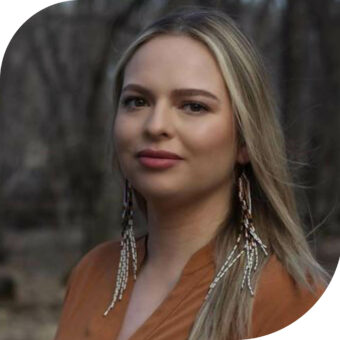
The planning committee for the Leadership for Equity: Expanding Inclusive Medical Culture series has curated resources and ideas recommended by some of Manitoba’s Indigenous physicians and learners.
Recommended by Dr. Courtney Leary, Chief of Staff, Norway House Hospital and Clinic, Medal of Excellence winner, 2023 Doctors Manitoba Awards. Cree

“You may not believe me, but being a doctor is easy compared to the every day life of being Indigenous. The training and the work is arduous, no doubt. But my most difficult day as a physician is nothing compared to my most difficult day as a native woman.”
Acceptance speech for the Medal of Excellence, 2023 Doctors Manitoba Awards
“We need to learn to walk before we can run. For physicians early on their journey in this area, it’s important to learn the history of colonization. BRAID has a great collection of resources, including the self-guided anti-racism walking tour. Mary Jane Logan McCallum’s work is a good starting point for physicians who want to learn more about the historical Indigenous experience of healthcare, including TB sanatoriums and the assumptions that were made about Indigenous people. And sometimes I like to recommend movies.”
- BRAID Network for Health Educators — led by Dr. Linda Diffey, PhD.
This link contains a collection of BRAID-curated resources, including the self-guided anti-racism walking tours, and how to get involved with BRAID.
Some physician leaders have organized groups of physicians, learners, and their families to do the walking tours together, on bike or foot.
Save the date for Thursday, September 28, 6:30 — 8:00 p.m. The Leadership for Equity series will host a talk by Dr. Linda Diffey, PhD. in honour of the National Day for Truth and Reconciliation.
- Mary Jane Logan McCallum, PhD, Professor of History, UofW and Canada Research Chair in Indigenous People, History and Archives.
Manitoba Indigenous TB History Project (video, influence of assimilation goals and racism on TB recovery approaches at 5:48)
Isolation and Aboriginal Health (article exploring how Indigenous health was depicted by medical professionals in Canadian medical journals between 1910 and 1970)
- Movies recommended by Dr. Leary:
Recommended by Dr. Marcia Anderson, Vice-Dean Indigenous Health, Social Justice and Anti-Racism and 2022 Doctors Manitoba Physician of the Year. Cree-Anishinaabe

“In medical school I experienced almost daily racial micro-aggressions as well as overt racism, like being told I didn’t belong, or wasn’t qualified. Eventually I learned to stick up for myself but that comes with extra stress and a label of ‘troublemaker’. Creating a safe learning environment is essential and requires understanding, critical self-reflection, and a commitment to growth. One book I have started recommending is Islands of Decolonial Love by Leanne Betasamosake Simpson. It reveals the heartbreak of trying to live and love each day, while trying to survive daily struggles with racism and colonialism.
Recommended by Ms. Mackenzie Hoy, medical student and Local Officer of Indigenous Health Senior, MMSA (22−23). Cree

“Dr. James Makokis, who holds several appointments in Alberta and who was also the winner of Season 7 of “The Amazing Race Canada” with his husband, has done a lot of work in the area of Two Spirit and Indigiqueer cultural safety. He is also active in promoting equity and inclusion for Indigenous people in our health and education systems as a way of dismantling systemic racism and honouring the Treaties.”
Recommended by Dr. Jade Young, Family Physician, Eriksdale and Garden Hill. Métis

“To be an Indigenous person in my role has been both difficult and rewarding. I have sat at tables throughout my time in medicine with too many people who understand nothing of the Indigenous experience. Tables where important decisions are made for individual patients or whole communities. It has been difficult to be a part of that. But it has also been an important opportunity. I have done my best to advocate for my Indigenous patients; to amplify their voice and their concerns. I make a sincere effort to help my colleagues understand the barriers Indigenous people face while interacting with our medical system. Had I not been at those tables I am not convinced anyone else would have done that work. My hope is that leadership in our medical system will prioritize making progress through the truth and reconciliation recommendations. My hope is that in time I won’t feel that I always need to be present at the table.
A useful resource I have recently come across illustrating the indigenous experience interacting with the Canadian medical system is: In Plain Sight Addressing Indigenous-specific Racism and Discrimination in B.C. Health Care.”
Other Resources
Manitoba Indigenous Cultural Safety Training (MICST)
Developed in partnership between San-yas and an advisory circle of Indigenous leaders and educators, including Dr. Catherine Cook, this self-directed course provides education on colonization, racism in healthcare contexts, gaps in health equity, and ways to take action.
Contact MICST, or your department/region, to inquire about individual and group registration options ($300 per seat). Doctors Manitoba individual and group CME rebates apply.
The National Collaborating Centre for Indigenous Health (NCCIH)
The NCCIH is a national Indigenous organization established in 2005 by the Government of Canada and funded through the Public Health Agency of Canada to support First Nations, Inuit, and Métis public health renewal and health equity through knowledge translation and exchange. They have a number of resources including: